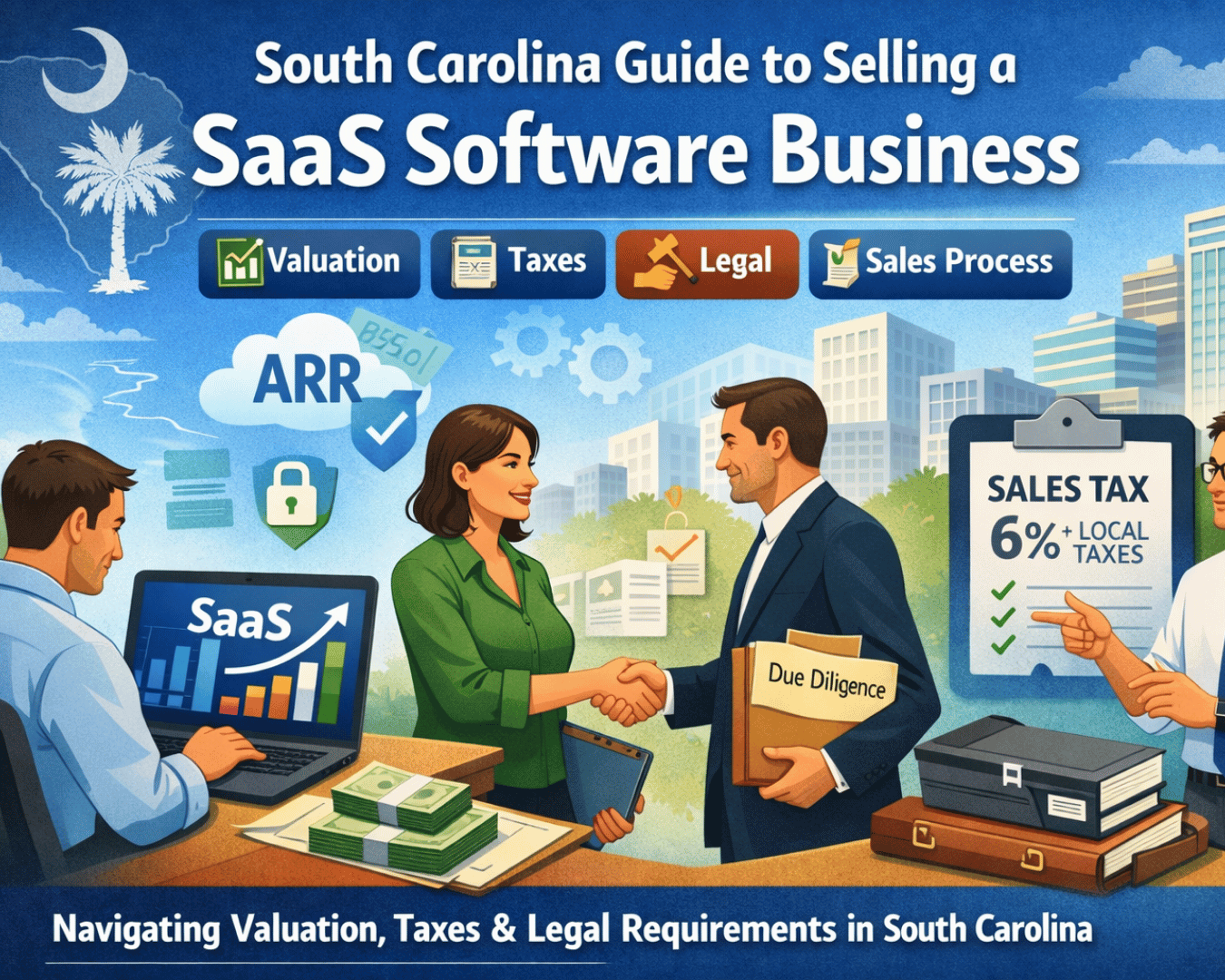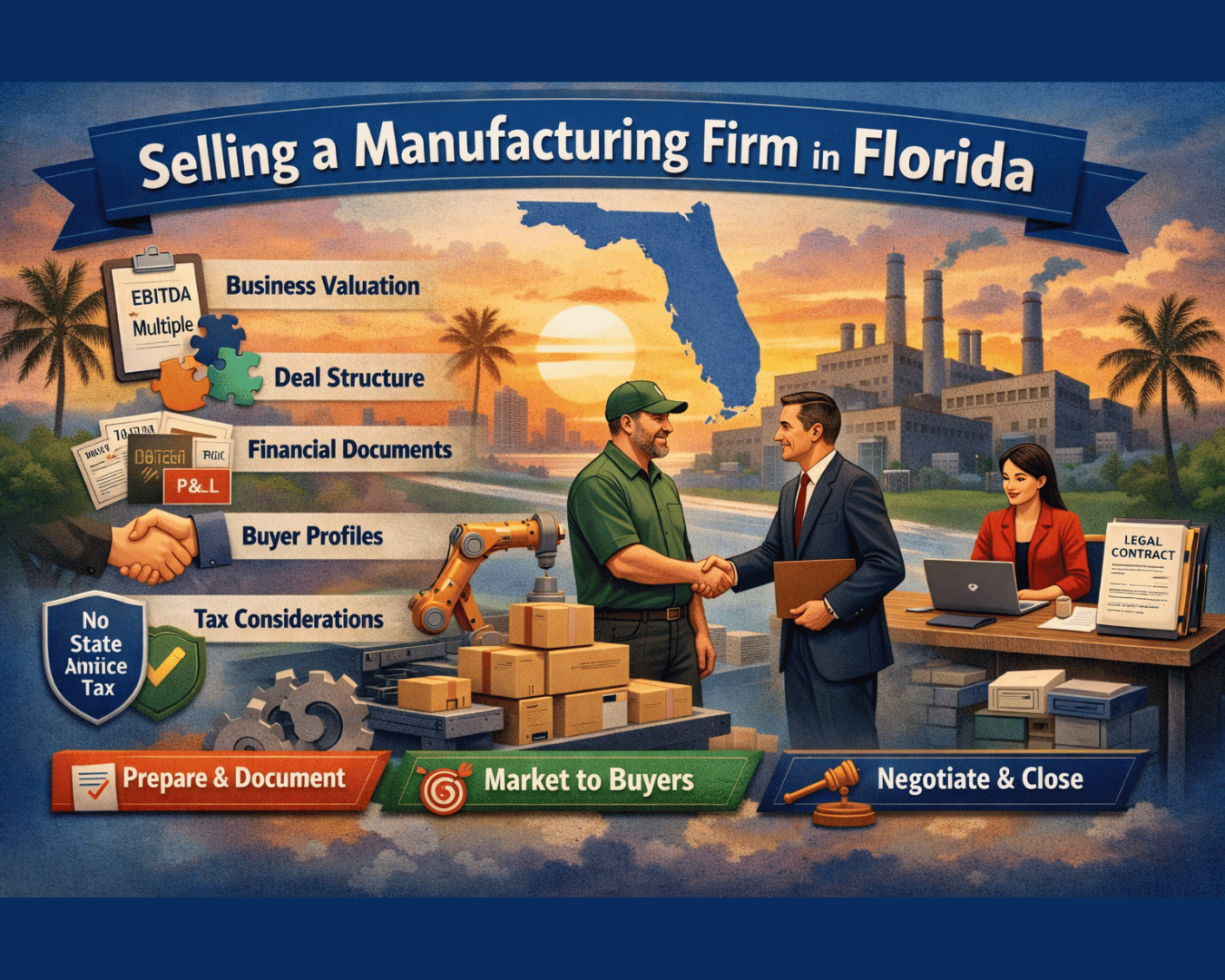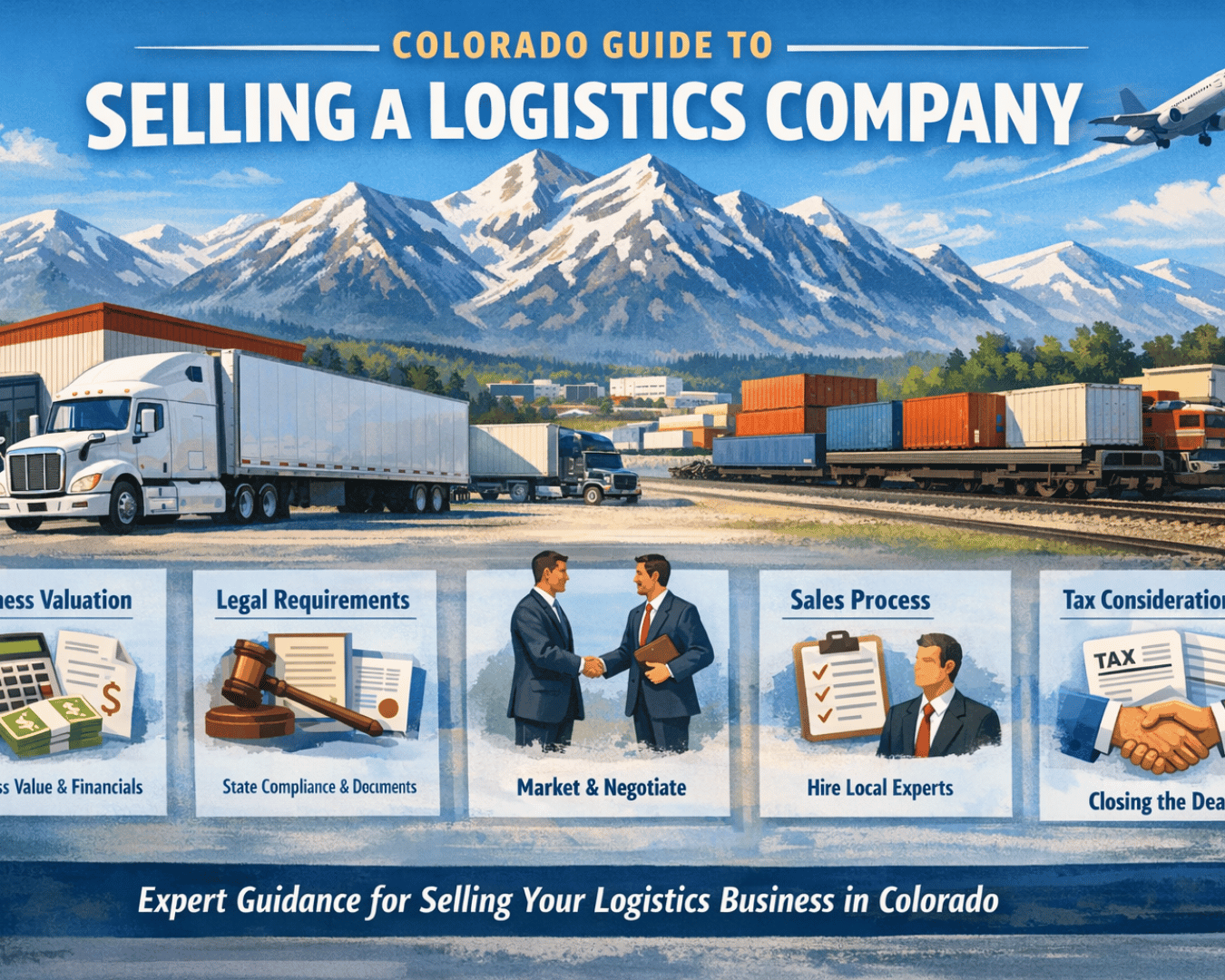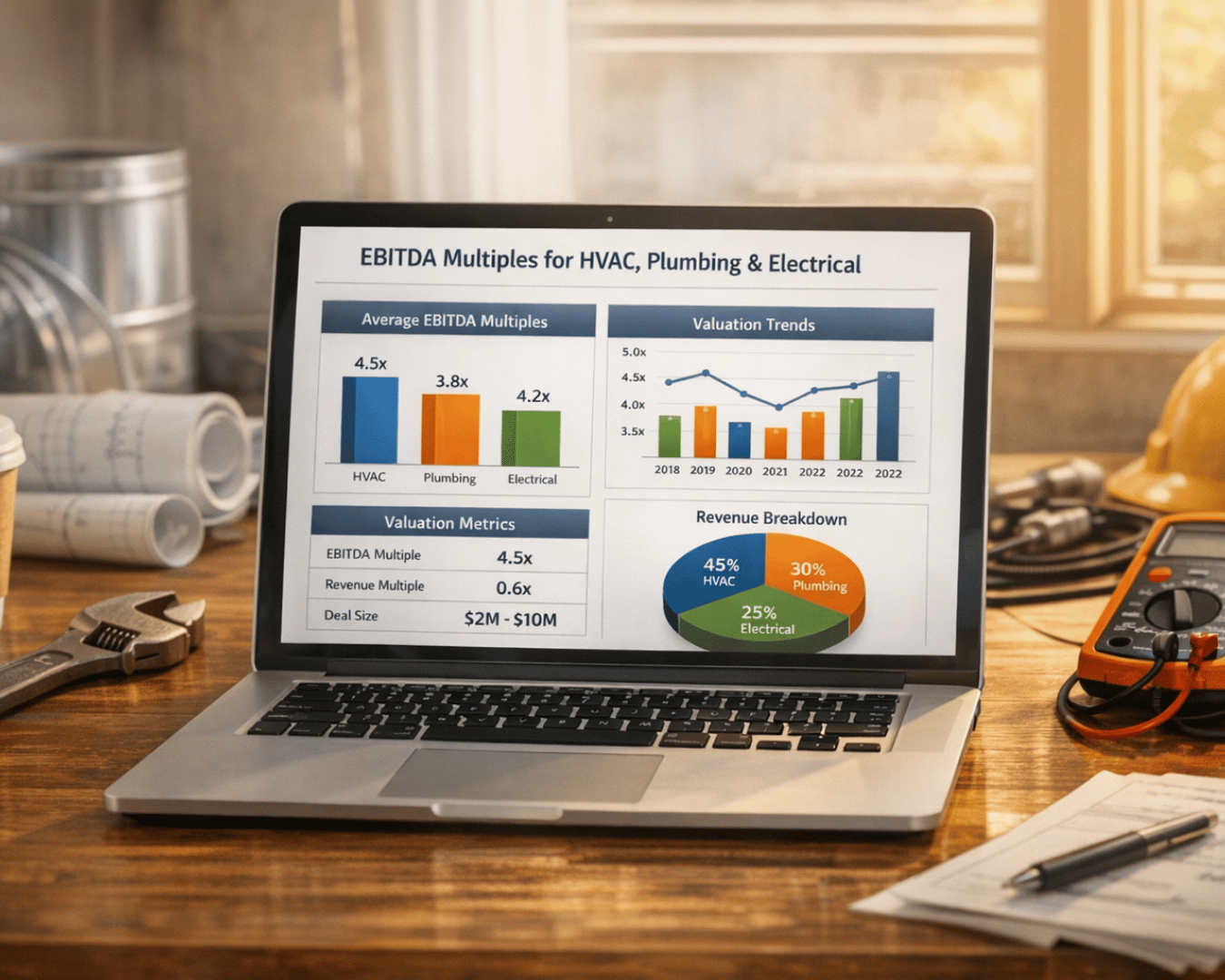Exit planning is about preparing your business for a change in ownership while maximizing its value and aligning with your financial goals. Whether selling to a third party, passing it to family, or closing operations, planning ahead ensures a smoother transition and better outcomes. Here’s what you need to know:
- Why plan early? 50% of business exits are triggered by unexpected events like death, divorce, or disability. Starting 3–5 years in advance allows time to improve operations and address challenges.
- Common exit strategies: Options include selling to a third party, family succession, employee buyouts, mergers, IPOs, or liquidation. Each has different financial and operational implications.
- Key preparation steps: Organize financial records, reduce owner dependency, and ensure efficient operations. A professional valuation helps set realistic expectations.
- Financial and legal considerations: Sale structure impacts taxes and proceeds. Asset sales, stock sales, and installment sales each have pros and cons. Estate planning is critical, especially with changing tax laws.
- Professional support: Work with advisors like financial planners, tax experts, and attorneys. Technology platforms can simplify valuations, buyer matching, and deal management.
Takeaway: Start early, get expert help, and explore all options to ensure your exit aligns with your goals and secures your financial future.
The Complete Business Exit Strategy You Need to Know
Exit Strategy Options
Small business owners face an important decision when it comes to exiting their business. The right strategy depends on financial objectives, desired level of involvement, and the overall vision for the business. Below, we break down the main exit strategies, each with its own set of advantages and challenges.
Common Exit Strategies
Third-Party Sales involve selling your business to an external buyer, such as a competitor, investor, or another company in your industry. Strategic buyers - those already operating in your sector - may pay higher prices due to potential synergies. On the other hand, financial buyers, like private equity firms, typically offer market value and may prefer you to stay on during the transition period.
Family Succession allows you to hand the business down to the next generation, preserving its legacy. However, the numbers paint a challenging picture: only 30% of family businesses make it to the second generation, and just 3% survive to the third. Nearly 70% of these transitions fail when moving from the founder to the next generation.
Management and Employee Buyouts (MEBO) provide a balance between maintaining the company’s culture and achieving financial returns. In a management buyout, the existing leadership team purchases the business. Alternatively, employee buyouts can be structured through Employee Ownership Trusts (EOTs), where shares are held in trust, allowing the company to continue operating under its traditional management framework.
Mergers and Acquisitions combine your business with another, potentially creating a stronger, more competitive entity. This approach is ideal when there’s strategic value in aligning operations, customer bases, or technologies.
Initial Public Offerings (IPOs) are rare for small businesses but can deliver substantial returns for companies with significant growth potential. However, this route requires navigating complex regulatory compliance and ongoing public company obligations.
Liquidation involves selling off assets and closing the business. While it typically results in the lowest financial returns, liquidation may be necessary when other options are not feasible or when the primary goal is to settle debts.
Choosing the Right Strategy
Selecting the most suitable exit strategy requires careful consideration of several factors. For instance, personal financial goals play a major role. Studies show that 80% to 90% of a small business owner's wealth is tied to their business, and 78% rely on the sale to fund at least 60% of their retirement. A professional valuation can help you understand your company’s worth and identify potential buyers.
Your preferences for control and involvement also matter. Do you want a clean break, or would you prefer to stay connected to the business? For instance, third-party sales often mean giving up control entirely, while family succession allows for continued involvement. Employee buyouts can provide a more gradual transition.
It’s also important to assess your business’s health and market conditions. Is your company in a strong position to attract buyers? Timing is another key factor. If you need to exit quickly, a third-party sale might be the most practical option. In contrast, family successions and employee buyouts typically require more time and preparation. Having a contingency plan is always wise, even if you’re leaning toward an internal transfer.
"Will the sale, after fees and taxes, provide sufficient funds for your retirement? If not, how can you enhance your business's value before transitioning?"
– Amy Wirtz, Certified Exit Planner and Senior Consultant with The Family Business Consulting Group
Tax implications also vary by strategy. Proceeds from third-party sales are generally taxed as long-term capital gains. Family succession may involve estate and gift taxes, while employee buyouts through EOTs can offer tax advantages, such as 0% Capital Gains Tax on qualifying sales.
Exit Strategy Comparison
| Strategy | Financial Return | Control Retention | Business Continuity | Best For |
|---|---|---|---|---|
| Third-Party Sale | High potential | Low | Variable | Owners seeking maximum financial return |
| Family Succession | Lower | Moderate | High | Businesses with capable family successors |
| Employee Buyout | Moderate | Moderate | High | Companies with strong management teams |
| Merger/Acquisition | High potential | Low | Variable | Businesses offering strategic value |
| IPO | Very high potential | Moderate | High | High-growth companies |
| Liquidation | Low | N/A | None | Businesses with limited buyer interest |
Interestingly, over 75% of business owners regret their exit decision because it didn’t align with their long-term goals. This highlights the importance of thorough planning and realistic expectations.
"The earlier you begin working on all of this, the more likely you'll be able to create exactly the future you want for your business and yourself."
– Brian Roth, National Executive, ESOP Finance and Advisory at Bank of America
Even if you have a preferred exit strategy, it’s smart to keep a backup plan. For example, if your goal is to transfer ownership internally, consider having the option to sell to an external buyer as a safeguard. Flexibility can be a lifesaver if unexpected challenges arise during the transition.
To help navigate these options, platforms like Clearly Acquired offer tools and services to simplify the process. From business valuation to deal closing, they provide the support small business owners need to achieve the best possible outcome.
Preparing Your Business for Sale
Getting your business ready to sell takes careful planning and attention to detail. Buyers are looking for a well-run, profitable operation that can thrive without you at the helm. The better prepared you are, the smoother the process will be - and the more likely you are to secure a strong valuation.
Financial Records and Operations
Get your financial records in order. Jessica Colby, Vice President – Wealth Advisor at First Business Bank, highlights why this step is so important:
"Organizing your financial data before selling your business is a strategic imperative. It's part of having a well-documented roadmap for potential buyers, guiding them toward a confident and informed decision. Messy finances can introduce unnecessary risk and uncertainty into the transaction, potentially costing you both time and money."
Buyers will typically want to review 3-5 years of financial documents, including profit and loss statements, balance sheets, bank statements, tax returns, and year-to-date P&L comparisons. To make things easier, organize these records by month for at least the last three years.
You’ll also need to "normalize" your financials to show the business's true earning potential. This involves adjusting for personal expenses, discretionary spending, or one-time costs that won’t carry over to the new owner. Use a four-column spreadsheet for your profit and loss statement, with columns for the original numbers, adjustments, normalized figures, and notes or explanations.
Streamlined operations are just as important. Buyers are drawn to businesses with efficient processes, modern technology, and a capable team. These factors reduce risks and make the business more appealing. By demonstrating strong operational systems, you can set yourself apart from competitors and build buyer confidence.
Reduce owner dependency. A business that relies too heavily on its owner is less attractive to buyers. As one expert explains:
"Owner dependency is one of the biggest hidden risks when selling a business. A business that can't operate effectively without you is less valuable in the eyes of a buyer - and that can directly affect your outcome in a sale."
To address this, document your core processes with procedures, templates, and training guides. Empower key employees to take on leadership roles and manage client relationships. This not only reduces dependency on you but also shows buyers that the business can run smoothly without your day-to-day involvement.
Business Valuation and Professional Help
Once your operations are in good shape, focus on determining your business's value. A professional valuation is crucial for setting realistic expectations and attracting serious buyers.
Hire an accountant to audit your financials, identify any discrepancies, and flag potential issues before they come up during due diligence. They can help you spot what makes your business attractive to buyers and address any weaknesses that could derail a sale.
Take steps to strengthen your financial position:
- Implement internal controls to prevent fraud and accounting errors.
- Clear any outstanding loans, credit lines, or vendor payments.
- Evaluate your inventory and sell off slow-moving or outdated stock.
You’ll also need to review contracts and agreements with customers, suppliers, and partners to ensure they’re transferable. Make sure all licenses and permits are current, and secure sensitive financial and customer data.
Steve Raymond, Managing Director at The DAK Group, emphasizes how these efforts pay off:
"Contrary to popular belief, buyers are highly risk-averse. The more a company professionalizes their business and looks internally before a sale, the more interest they'll get from buyers and the more likely they are ultimately to close a deal."
Backup Plans
Even with thorough preparation, the sale process can be unpredictable. Buyers might back out, market conditions could shift, or unexpected issues might arise during due diligence. That’s why having a backup plan is essential.
If your primary exit strategy involves passing the business to family or selling to employees, consider identifying third-party buyers as an alternative. Similarly, if you’re targeting strategic buyers, keep financial buyers in mind as a fallback option.
Start succession planning early. Train future leaders, document critical processes, and establish systems that allow the business to operate independently of your involvement. This preparation not only makes your business more appealing to buyers but also ensures continuity if you need to exit sooner than expected.
Timing is another key factor. Market trends, industry cycles, and your business's performance all influence valuation. A backup plan gives you the flexibility to wait for the right moment or pivot quickly if circumstances change.
Jessica Colby underscores the importance of preparation:
"By organizing your financials, you smooth the due diligence process and give the potential buyers more confidence about the financial health of your business. This proactive approach sets the stage for a successful sale and maximizes the value and wealth you can get from your business."
Platforms like Clearly Acquired can help simplify the preparation process, offering tools for valuation, deal management, and connecting with qualified buyers. These resources support business owners through every step, from organizing financials to closing the deal.
sbb-itb-a3ef7c1
Financial, Legal, and Tax Planning
Selling your business is a complex process, and the financial and legal details can have a major impact on your exit strategy. Preparing early can help protect your interests and ensure you maximize the proceeds from your sale.
Financial Preparation
The way you structure the sale - whether as an asset sale or a stock sale - can significantly affect your financial outcome. For example, in an asset sale, different assets are taxed at varying rates, while a stock sale often benefits from the long-term capital gains tax rate, which is typically lower. Buyers usually lean toward asset sales because of the tax advantages, but sellers, particularly those with C Corporations, often prefer stock sales to avoid double taxation.
Another option to consider is an installment sale. This approach allows you to spread out capital gains taxes over time, improving cash flow and potentially lowering your overall tax burden. Additionally, specialized tax strategies can make a big difference. For instance, Section 1202 of the IRS Code can exclude up to $10 million or 10 times the stock’s adjusted basis from capital gains taxes. Other strategies include using Charitable Remainder Trusts (CRTs), reinvesting proceeds into Opportunity Zones, employing a 1031 exchange for similar asset reinvestments, or transitioning ownership through an Employee Stock Ownership Plan (ESOP).
Legal Documentation
Once your finances are in order, it’s critical to have strong legal documentation. These documents protect both you and the buyer throughout the transaction. Comprehensive agreements - such as purchase agreements, asset transfer documents, and contracts for any ongoing obligations - should explicitly outline what’s being transferred, when, and under what terms.
It’s also important to review existing contracts with customers, suppliers, and partners for any transferability or change-of-control clauses. Make sure all compliance records, like business licenses, permits, and regulatory filings, are up to date. Employment agreements and non-compete clauses should also be reviewed to understand their implications on the sale.
Tax Planning and Implications
Tax planning is another key piece of the puzzle when selling your business. Federal, state, and local taxes can all affect your final proceeds. Since long-term capital gains rates are generally lower than ordinary income rates, the sale structure plays a crucial role in minimizing taxes.
Estate planning becomes especially important if the sale results in significant proceeds. The lifetime gift and estate tax exemption is set to drop from $13.61 million in 2024 to about half that amount on January 1, 2026. For 2025, the federal estate tax exemption will be $13.99 million. If your total estate exceeds these thresholds, you’ll need to explore strategies to reduce estate taxes.
To navigate these complexities, it’s wise to work with experienced professionals, such as tax advisors, business attorneys, and estate planning experts.
Platforms like Clearly Acquired can simplify the process by connecting you with qualified professionals and tools to handle the financial and legal aspects of your business sale efficiently.
Professional Support and Technology Tools
Once you’ve tackled financial, legal, and tax planning, the next critical step in executing your exit strategy is relying on professional advisors and modern technology. Exiting a business isn’t just about having your financials in order - it’s about having the right team and tools to guide you. Consider this: 80–90% of business owners who attempt to sell fail to close, and 78% don’t have a dedicated transition team in place. With these risks in mind, assembling the right support becomes essential.
Professional Advisors
Having the right advisory team can make or break your exit. Since your future is deeply connected to your business, external experts can help bridge the gap between a failed sale and a successful exit. Your personal advisory team should include:
- Wealth Advisor (or Financial Planner): They’ll assess your personal financial needs and calculate any gaps in your wealth.
- Tax Advisor (or CPA): They’ll help structure the sale to minimize tax liabilities.
- Estate Attorney: They’ll focus on preserving your wealth through effective estate planning.
On the business side, you’ll need specialists who understand the complexities of transactions:
- Business or Transaction Attorney: They’ll handle contracts and agreements.
- Growth Consultant: They’ll identify ways to enhance your business’s value.
- Business Broker or M&A Advisor: They’ll connect you with potential buyers and position your company strategically.
- Risk Advisor: They’ll help manage uncertainties by recommending appropriate insurance coverage.
To ensure success, your advisors must work as a cohesive unit. Regular meetings, clear communication, and appointing a coordinator to oversee the process can help keep everyone aligned with your goals, timelines, and milestones.
"The owner must have something to move to and an understanding of what is next. They should not be in a scenario of moving away from something they have spent their life immersed in. That is a formula for regrets." – Steve Hopkins, Owner of Charter BTA, LLC
Technology Platforms for Exit Planning
In addition to expert guidance, leveraging technology can simplify and optimize the exit process. Today’s platforms can manage everything from valuations to closing, making the process more efficient. One example is Clearly Acquired, a tech-enabled Main Street investment bank. It combines capital, advisory services, and proprietary tools to support the entire transaction lifecycle.
Some of the platform’s features include:
- Streamlined Screening: Advanced search tools, automated NDAs, and AI-driven data rooms for secure information sharing during due diligence.
- Financing Solutions: Options like SBA loans (SBA 7(a) and SBA 504), commercial loans, lines of credit, equipment financing, real estate loans, and equity injections.
- Centralized Management: Custom dashboards and deal hubs to track buyers, manage communication, and monitor progress.
Educational Resources and Networking Opportunities
Many platforms also provide educational resources to help business owners navigate the exit process. Courses on valuation, due diligence, financing, and negotiation strategies can help you make your business more appealing to buyers.
Connecting with peers who’ve successfully sold their businesses can offer invaluable insights. Networking communities and buyer forums allow you to share challenges, gain tailored advice, and learn from others’ experiences. Access to current market data and industry trends also empowers you to make informed decisions about timing, pricing, and positioning.
Key Takeaways
Planning a successful business exit isn’t something you can afford to put off. With 12 million small businesses projected to change hands in the next 10–15 years and Baby Boomers making up about 41% of small business owners in the U.S., time is running short for many to prepare effectively. The businesses that navigate this process well have a few things in common: they start early, think strategically, and rely on the right team for support.
The numbers paint a clear picture of why early planning matters. If 85% of your net worth is tied up in your business, as is often the case, waiting until the last minute can lead to rushed decisions and reduced returns. Ideally, aim to start planning at least 3–5 years before your intended exit.
An advisory team that aligns with your goals is critical. This team should include both personal advisors - such as a wealth advisor, tax professional, or estate attorney - and business specialists like a transaction attorney, business broker, or growth consultant. Together, they can help you navigate the complexities of transitioning out of your business.
Your exit strategy should meet both your financial and personal objectives. Collaborate with a financial professional to determine your target sale proceeds. Knowing this target allows you to identify any gap between your business’s current value and the value you need, giving you time to make strategic improvements.
"Designing an exit strategy today that integrates your estate, retirement and succession plans can help ensure a smooth transition while maximizing the value of your business."
- Bryan Koepp, Wealth Planning Executive for Regions Private Wealth Management
Technology can also play a big role in simplifying the process. Modern platforms can handle tasks like valuations, buyer matching, and deal management, making your exit more efficient and potentially more profitable. Features such as automated NDAs, AI-powered data rooms, and centralized tools can significantly cut down on the time and complexity involved in finding the right buyer.
It’s worth noting that only about one-third of family businesses have a succession plan in place. Whether you’re transferring ownership to family, selling to a third party, or planning a management buyout, early preparation, professional advice, and a well-thought-out strategy are essential.
Successful exits don’t happen by accident. They’re the result of careful planning and execution. Businesses that succeed in this area invest in accurate valuations, streamline their operations, keep their financial records spotless, and surround themselves with experienced professionals. Most importantly, they give themselves the time needed to get everything right.
FAQs
What key factors should I consider when planning an exit strategy for my small business?
When you're thinking about an exit strategy for your small business, the first step is to define your priorities. Are you looking to get the highest possible return, maintain your business's legacy, or create a smooth handoff for your employees or family? Your choice of strategy - whether it's selling to an outside buyer, passing ownership to a family member, or setting up a buyout with trusted employees - should reflect these goals.
It's also crucial to take a close look at your business's financial standing, the current market environment, and its potential for future growth. Carefully assessing these elements will help you pinpoint the best time and approach to not only maximize your business's value but also ensure the transition goes smoothly for everyone involved.
What steps can I take to make my business more appealing to buyers and maximize its value before selling?
To make your business more attractive to potential buyers and increase its value, start by getting your financial records in order. They should be accurate, well-organized, and updated regularly. It's also a good idea to conduct a professional business valuation. This will give you a clear picture of your business's worth and highlight areas that may need attention.
Work on increasing profitability by improving cash flow, cutting unnecessary costs, and diversifying your revenue sources. Strengthen your leadership team, document your standard operating procedures, and lay out a clear growth strategy. These steps can demonstrate to buyers that your business has solid potential for future growth.
Finally, pay attention to your online presence and brand reputation. A strong digital footprint and positive brand image can go a long way in building buyer confidence. By focusing on these areas, you’ll position your business as a more appealing and valuable opportunity for potential buyers.
What resources and tools can help simplify the exit planning process for my small business?
Simplifying the process of exit planning becomes much easier when you bring in the right expertise and tools. Collaborating with exit planning advisors or strategic consultants can provide personalized advice to help you enhance your business's value and ensure a seamless transition.
On top of that, technology can play a big role in streamlining the process. Tools equipped with AI-driven analytics, financial forecasting capabilities, and deal management features can provide valuable insights and help you make smarter decisions. There’s also specialized software built specifically for exit planning that can automate intricate tasks, saving both time and effort while improving precision. By combining professional guidance with these tools, you can navigate your exit planning journey with greater confidence and efficiency.



















%20%20Process%2C%20Valuation%20%26%20Legal%20Checklist.png)




















%20in%20a%20%2420M%20Sale..png)
%20vs.%20Conventional%20Loans%20for%20business%20acquisition.png)























.png)


.png)
.png)







































